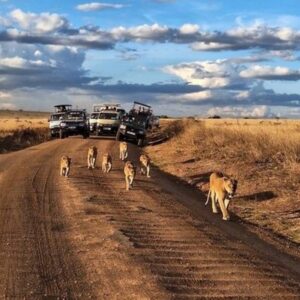By Jennifer Heebner, Editor in Chief
A report from a Kenyan news site reveals that the government is finalizing a “historic framework” that will give Kenya’s artisanal miners access to dig in the country’s national parks.
According to Kenya News, “The government is finalizing a joint operational framework that will provide guidelines on how miners in Kenya’s artisanal mining subsector will be granted controlled access to start mining operations inside national parks.”
The move stems from a presidential directive asking for artisanal miner access to locations like Tsavo National Park, the largest national park in Kenya. Artisanal miners have been petitioning government for decades for permission “to exploit precious stones in the mineral-rich national parks.”

Source: @kenyawildlifeservice
The article also maintains that experts from the departments of mining, wildlife, and forestry were tapped to structure the framework. Elijah Mwangi, the Principal Secretary (PS) State Department for Mining, told the outlet that the document will “undergo public participation” before implementation.
David Zowe, Chairperson of Taita-Taveta Artisanal Miners’ Association, is pleased with the announcement of access for artisanal miners, a section of which “already sneak into the wild-animal infested parks in total disregard of their safety to mine gemstones,” according to the article. “We will now get access to the protected areas without putting our lives in danger,” says Zowe.
Proponents of the move argue that large bare areas could be mined and then rehabilitated. Not surprisingly, conservationists are doubtful and sour on the idea of national parks, established to preserve green space and wildlife, being opened for mining. Zowe insists that the only way to change negative perspectives between the community and the national parks “is to make the community benefit directly from the park,” he continues.

Source: @kenyanwildlifeservice
There are more than 20 national parks in Kenya, 28 National Reserves, and five National Sanctuaries, comprising about 8% of the total landmass of the country, according to the Kenya Wildlife Service (KWS). These parks are home to rhinoceroses, buffalos, lions, leopards, hippopotamuses, crocodiles, hundreds of different types of birds, and more.
Many have long worked to protect Kenya’s rich wildlife reserves. Mining operator Bridges Tsavorite, which has mined Tsavorite in southern Kenya for decades, has been a staunch proponent of conservation efforts on its lands. Founder Campbell Bridges, murdered by illegal miners in 2009, was even called a “kindred spirit in conservation” by 2004 Nobel Peace Prize recipient Wangari Maathai.

AGTA reached out to KWS and renowned conservationist Dr. Paula Kahumbu, O.G.W, who is also Chief Executive Officer of WildlifeDirect; neither had responded by press time.
However, Kahumbu spoke out on X upon hearing the news.
“Today woke up to the HORRIFYING news that the government is “Finalizing Historic Framework To Grant Kenya’s Artisanal Miners Access To Mine In National Parks”… The spin on the language—historic agreement—does not fool anyone … The government can’t rein in the massive destruction ongoing by commercial and regulated miners who are wreaking havoc and destroying archaeological and landscape heritage … These companies are doing nothing to restore the damage and I doubt they are following their NEMA permits which require them to stay within certain blocks, to protect the environment and rehabilitate degraded land. THE INTEGRITY OF PARKS MUST BE PROTECTED.”
This is proprietary content for AGTA and may not be reproduced.
